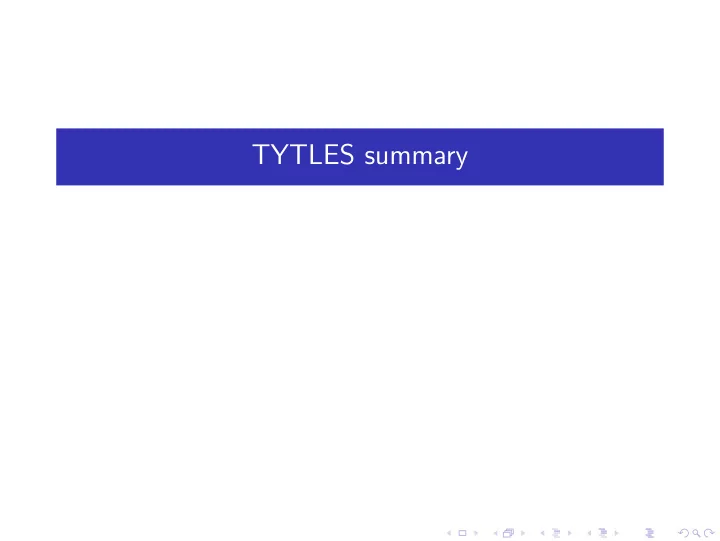

TYTLES summary
Why types for lexical semantics? ◮ generative lexicon, coercion, learning, meaning in flux, dynamic system ◮ dependent types ◮ probability ◮ computability 2 / 10
Generative lexicon, . . . , dynamics ◮ types can remain constant over change of witnesses/inhabitants ◮ possibility of observing new witnesses of a type ◮ different from a Montagovian notion of sense: function from possible worlds to extensions — if you change the extension the sense changes ◮ the type a word is associated with can also change — structured types allow us to give an account of change not available in a Montagovian sense 3 / 10
Papers relating to some kind of dynamic aspect of types ◮ Stergios Chatzikyriakidis, Mathieu Lafourcade, Lionel Ramadier and Manel Zarrouk. Type Theories and Lexical Networks: Using Serious Games as the Basis for Multi-Sorted Typed Systems ◮ Staffan Larsson. Perceptual Meaning in TTR Judgement-based Semantics and Conceptual Spaces ◮ Simon Dobnik. Interfacing Language, Spatial Perception and Cognition in Type Theory with Records ◮ Ellen Breitholtz. Are Widows Always Wicked? Learning concepts through enthymematic reasoning ◮ Bruno Mery. The Relative Complexity of Constraints in Co-Predicative Utterances ◮ Livy Real and Alexandre Rademaker. An Overview on Portuguese Nominalisation ◮ Seohyun Im and Chungmin Lee. A Developed Analysis of Type Coercion Using Asher’s TCL and Conventionality 4 / 10
Paper relating to the notion of structured types ◮ Frames in hybrid logic ≈ frames as record (types) ◮ can expressions of hybrid logic be thought of as record types (event types)? ◮ Laura Kallmeyer, Timm Lichte, Rainer Osswald, Sylvain Pogodalla and Christian Wurm. Quantification in Frame Semantics with Hybrid Logic 5 / 10
Dependent types ◮ story of Martin-L¨ of and donkey anaphora ◮ DRT conditionals sort of reinvented dependent types ◮ no corresponding general strategy in standard model theoretic semantics 6 / 10
Some uses of dependent types ◮ specific indefinites — Justyna Grudzinska and Marek Zawadowski. A Puzzle about Long-distance Indefinites and Dependent Type Semantics ◮ enthymemes/topoi — Ellen Breitholtz. Are Widows Always Wicked? Learning concepts through enthymematic reasoning ◮ presupposition — Daisuke Bekki and Miho Satoh. Calculating Projections via Type Checking; Ribeka Tanaka, Koji Mineshima and Daisuke Bekki. Factivity and Presupposition in Dependent Type Semantics 7 / 10
Probability ◮ probability associated with vagueness ◮ probability associated with type judgements vs. probability of possible worlds ◮ Peter Sutton and Hana Filip. Probabilistic Mereological TTR and the Mass/Count Distinction 8 / 10
Computability ◮ tractability more likely than with traditional possible world semantics ◮ Pepijn Kokke. Formalising type-logical grammars in Agda 9 / 10
Conclusion ◮ a broad span of approaches, different type theories ◮ but common assumptions and goals ◮ we should keep talking . . . 10 / 10
Recommend
More recommend